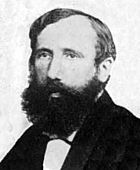Isaac Todhunter facts for kids
Quick facts for kids
Isaac Todhunter
|
|
|---|---|

Isaac Todhunter
|
|
| Born | 23 November 1820 |
| Died | 1 March 1884 (aged 63) |
| Nationality | English |
| Alma mater | University College, London University of London St John's College, Cambridge |
| Awards | Smith's prize (1848) Adams prize (1871) Burney prize |
| Scientific career | |
| Fields | Mathematics |
| Academic advisors | William Hopkins |
| Influences | Augustus De Morgan |
Isaac Todhunter (born November 23, 1820, died March 1, 1884) was an English mathematician. He is famous for the many books he wrote. These books were about mathematics and its history. He was also a Fellow of the Royal Society.
A Life of Learning
Isaac Todhunter was born in Rye, Sussex. His father, George Todhunter, was a minister. His mother was Mary Hume. Sadly, Isaac's father passed away in 1826. After this, his mother opened a school in Hastings where Isaac was educated. He first attended a school run by Robert Carr. Later, he went to a school opened by John Baptist Austin.
Isaac later became an assistant teacher at a school in Peckham. At the same time, he took evening classes at University College, London. There, a famous mathematician named Augustus De Morgan inspired him. In 1842, Isaac won a special scholarship for mathematics. He earned his Bachelor of Arts (B.A.) degree from London University. He also won a gold medal for his Master of Arts (M.A.) exam. Around this time, he became a math teacher at a school in Wimbledon.
In 1844, Isaac Todhunter went to St John's College, Cambridge. He was the top math student in his year in 1848. This achievement is called being a "senior wrangler." He also won the first Smith's Prize and the Burney Prize. In 1849, he became a fellow at the college. He then started working as a college lecturer and private tutor.
His career continued to grow. In 1862, he became a fellow of the Royal Society. This is a very important group for scientists. In 1865, he joined the Mathematical Society of London. He won the Adams Prize in 1871. That same year, he was chosen to be on the council of the Royal Society. He became an honorary fellow of St John's College in 1874. He had given up his earlier fellowship when he got married in 1864. In 1880, his eyesight started to get worse. Soon after, he became ill with paralysis.
Isaac Todhunter is buried in the Mill Road cemetery in Cambridge.
His Personal Side
Isaac Todhunter married Louisa Anna Maria Davies on August 13, 1864. Louisa was the oldest daughter of Captain George Davies. Captain Davies later became an Admiral. Isaac passed away on March 1, 1884, at his home in Cambridge. His wife and their five children (four sons and one daughter) survived him. A special plaque and a medallion portrait were placed in his college to remember him.
Beyond math, Isaac was very talented with languages. He knew Latin and Greek very well. He also spoke French, German, Spanish, Italian, Russian, Hebrew, and Sanskrit. He knew a lot about the history of philosophy. He even worked as an examiner for moral sciences exams three times.
What He Wrote
Isaac Todhunter wrote many important books. He is especially known for his textbooks on different areas of mathematics. He also wrote books about the history of mathematics.
Here are some of his well-known books:
- Treatise on the Differential Calculus and the Elements of the Integral Calculus (1852)
- Treatise on Analytical Statics (1853)
- Treatise on the Integral Calculus (1857)
- Treatise on Algebra (1858)
- Treatise on Plane Coordinate Geometry (1858)
- Plane Trigonometry (1859)
- Spherical Trigonometry (1859)
- History of the Calculus of Variations (1861)
- Theory of Equations (1861)
- Mechanics for Beginners (1867)
- A History of the Mathematical Theory of Probability from the Time of Pascal to that of Laplace (1865)
- History of the Mathematical Theories of Attraction and Figure of the Earth from Newton to Laplace (1873)
He also revised a translation of Euclid's Elements. This is a very old and important book about geometry. His major historical works include a history of Probability theory. This book covered the topic from the time of Blaise Pascal to Pierre-Simon Laplace.
Some of his publications can be found online: Isaac Todhunter's publications at Google Books.
See also
 In Spanish: Isaac Todhunter para niños
In Spanish: Isaac Todhunter para niños
 | John T. Biggers |
 | Thomas Blackshear |
 | Mark Bradford |
 | Beverly Buchanan |

